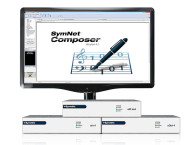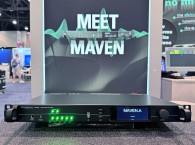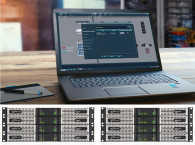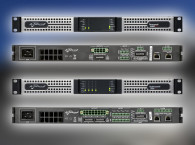
The two new Radius NX processors are programmed using Symetrix' Composer software for Windows, offering identical DSP resources provided by a next-generation SHARC dual-core processor that places the burden of large matrices in one core, while freeing the second core for general-purpose signal processing. This makes it possible to design very large and complex systems around a single Radius NX.
A configurable, 4-port gigabit switch serves both the Dante and control networks. This reduces or eliminates the need for external switches and prevents 100 megabit bottlenecks. Each Radius NX model offers two 1000 Base-T Dante ports, two 1000 Base-T Ethernet ports for Symetrix Composer host control and third-party accessory control over IP, an RS-232 serial port for third-party accessory control, and an ARC port that distributes power and RS-485 data to one or more Symetrix ARC devices. A USB audio I/O port interfaces with soft codecs or recording and playback software on Windows, Mac, and Linux platforms. The USB audio port can be configured for up to 8x8 line I/O, 2x2 line I/O, 1x1 speakerphone, or 1x1 echo cancelling speakerphone profiles.
“The Radius NX series represents a major leap forward in advanced audio signal processing,” reports Symetrix Senior Product Manager Trent Wagner. “Either model will be an outstanding core component of network AV systems, delivering the flexibility, reliability, and superb sonic performance our customers expect from Symetrix.”
The main differences between Radius NX models are analog I/O, logic output, and external control input capacity. The Radius NX 4x4 has four mic/line inputs, four line outputs, four logic outputs with four paired common ground pins, and two analog control inputs that can be used as two potentiometer inputs or as four switch inputs. The Radius NX 12x8 offers 12 mic/line inputs, 8 line outputs, 8 logic outputs with 4 paired common ground pins, and 4 analog control inputs handling up to 8 switches.
Both Radius NX models feature a card slot that supports all currently available, optional Radius and Edge I/O expansion cards, including VoIP, ATI, and USB cards. Either Radius NX also can connect directly to a complete lineup of software-controlled, Dante-enabled, analog I/O expanders to add larger numbers of analog inputs and outputs.
An optional AEC coprocessor, available in single-core or dual-core versions, enables up to 16 channels of wide-band acoustic echo cancelling for the highest possible levels of clarity and intelligibility in AV and distance learning applications. Each core corresponds to a single AEC module in Composer, providing up to eight channels with a single reference or up to four channels with independent references for each channel. Radius NX Composer AEC modules are fully virtualized - AEC can be applied to any source and routed to any destination. Ultra-fast convergence boosts performance at onset of conversations and when roving microphones are in use.
Radius NX supports a virtualized and scalable AEC co-processor module, providing up to 16 full bandwidth AEC channels. Radius NX AEC Coprocessors enable the highest possible levels of clarity and intelligibility in AV conferencing and distance learning applications. Performance and resource utilization are optimized by matching the number of channels, number of references, and tail length to system requirements.
www.symetrix.co






